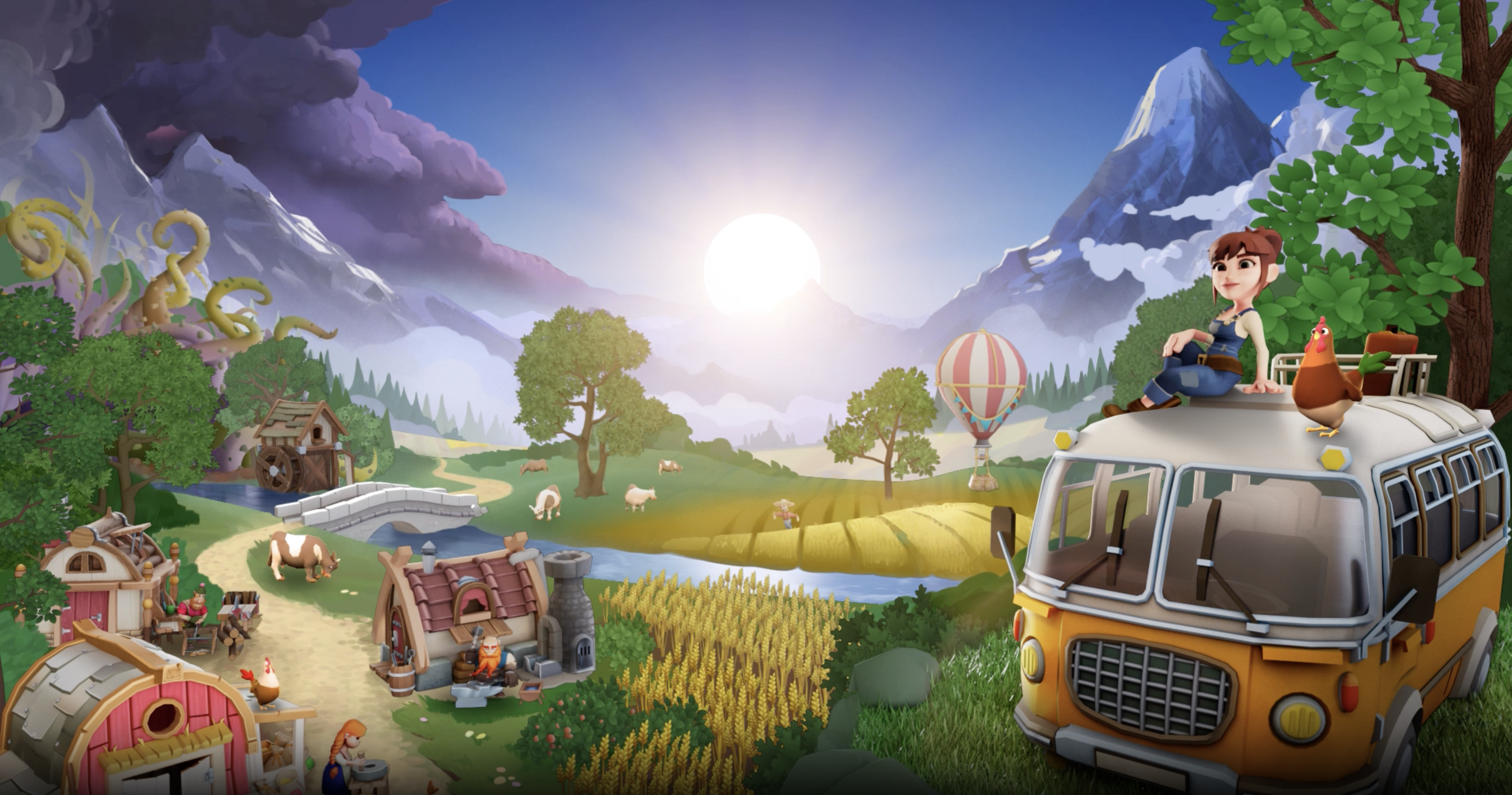Today, we are thrilled to introduce you to one of the bright talents at InnoGames – Martina Llop Salas, a junior game designer who is working for Inno Games. With her creative vision and passion for storytelling, she brings fresh perspectives that drive the innovation and excitement in our games. Let’s dive in and learn more about her journey, inspirations, and what she loves most about creating immersive gaming experiences.
Hey Martina, nice to meet you. First up, can you tell us about your background and how you got started in game design?
Hey, sure. I stumbled upon a videogame creation workshop while I was studying my bachelor on Film and Media, and I loved how special storytelling is on the videogame format. I pretty much knew that I wanted to work in the videogames industry at that moment. I studied a Master on Videogame Creation and the part I loved the most was Game Design.
That sounds interesting. What are some of your favorite games and why do you enjoy them?
I enjoy a lot of narrative games, such as What Remains of Edith Finch, Gone Home, or Journey, and I also love puzzle games, such as Gorogoa or The Witness. I’d say Metroidvanias are also one of my favourite genres, I really love how game progress is so deeply intertwined with level design.
The reason why I like these games is that they resonate with my values and in a way, they help me find meaning in the chaos that is reality. Metroidvanias show you that redoing your steps with acquired abilities can show you new paths, and going backwards is sometimes the only way to go forward.
Puzzles help me realize everything is made from patterns that all belong somewhere, and there is a criteria to make sense out of chaos. Everything can be a piece in an artifact, you just need to find what is the function of each piece and where does it belong.
And narrative games resonate with my passion for stories and storytelling, showing me how to carve the narrative of my own life experiences and provide them with meaning.
Awesome. Talking about your work, can you describe a game design project you worked on that you are particularly proud of?
What was your role and what were some key challenges you faced?
I really enjoyed working on Eleanor’s Song, my bachelor’s thesis. It’s a musical walking simulator that tells the story of a mother and the daughter she abandoned when she was young. I was involved in the game design and in the soundtrack. One other thing I really enjoy is soundtracks. They can tell so much of a story without us even noticing! For this reason, I’d say the main challenge was to integrate musical mechanics into the game. We wanted each episode to be unique, to have a clear narrative goal that went along well with a musical genre, and the game mechanics.
Wow. Super cool. Now, how do you approach the initial stage of designing a new game? What are the first steps you take?
It really depends on the starting point, sometimes you start from a story, some others from a mechanic idea, some others from a X meets Y. For each game it might be different, but there’s also generic questions that help to specify what am I looking for: what is the theme? How do you play? What sort of emotions do I want to create? Are there winning and losing conditions?
A crucial part of this concept phase for me is to be filled with references of games of the same theme, genre, mechanics, aesthetics, target audience, and when it comes to story and characters, even outside the videogames format.
Once I have a better idea of what the theme and genre of the game is, I make a list of must haves, what is part of the essentials, of the identity of the game. And everything else will revolve around these essentials. They should fit a single phrase.
Sounds like a lot of work. Can you give an example of a game mechanic that you designed, and explain how it enhances the gameplay experience?
I worked alongside other designers in designing Sunrise Village’s new event type, Multi-Stage Events. This was a type of event with high spending potential targeted at premium users that consisted of 3 maps that were playable for four days. The particularity of this event is that it’s a closed economy and it includes extra exploration mechanics that are not included in normal stages. All these features worked inside one ecosystem that needed to be brought alive.
Interesting. And how do you ensure that a game is both fun and engaging for players?
Studying your audience and understanding what drives them, what’s fun for them, what do they care about, is in my opinion very important so your game can resonate with them. The better you know the target audience, the easier it is to create a common language, to play with their expectations, to anticipate fun moments and deliver meaningful rewards for the efforts put into the game. For live games, having a community is a great advantage for understanding what aspects of your game your players enjoy.
On a theoretical level, there is a loop of challenges and rewards that increases difficulty over time – the famous easy to learn, hard to master –, that I always try to take into consideration when balancing a layer of a game. I enjoy trying out different curves and see how changing numbers on an excel file can alter the game experience.
On another note, I would say the best way to ensure fun and engagement, is to design something that also resonates with you individually, to find something that you find fun.
We all know that the industry constantly changes. What strategies do you use to keep yourself updated with the latest trends in the gaming industry?
InnoGames has an awesome Analytics Departments that writes reports on industry trends very regularly and shares relevant news. Right now, this is my main source of keeping myself updated. During periods in which I have more free time, I enjoy listening to podcasts or following my favorite youtubers.
Of course, playing competitors and newcomers is something I do regularly, as it’s the best way to grasp what makes a game successful and fun to play.
Players feedback is also important isn´t it? How do you incorporate player feedback into your designs?
It depends on the type of feedback. Some players make suggestions as for what kinds of themes they would like for new stages or events, and we normally take those into consideration. When Players particularily like the way a stage or an event has been designed, we tend to repeat the same concept, since it was successful for the community. But it’s not always easy to balance feedback with the needs and goals of the product.
Since the industry is facing constant changes, what are your thoughts on the future of game design? What trends or innovations are you most excited about?
I’m very curious to see how the mobile industry is going to develop, what new trends and players will enter the market, and how games are going to respond to the technical advances of mobile devices. It’s an industry that’s constantly changing and is very fluid.
It also looks like there’s going to be space and demand for game design beyond the industry of games. New trends show that gamification is a very effective form of learning and working, so I can imagine game designers would enter an era of a lot of new applications! I’m excited for that because I also think playing is a very powerful form of learning and games have a lot of potential beyond entertainment.
Maybe someone, who is interested in becoming a game designer, is reading this article. What advice would you give to them?
It’s better to have a lot of small finished projects, than something big and unfinished. Nowadays the most powerful tool to show your skills is to show what you’re capable of doing. If you want to build a portfolio, focus on something doable, and try out a lot of different things!
And of course, play!
Lastly, what do you consider the most important aspect of game design, and why?
Fun! The ultimate goal must be that what we do, has to be fun to play, and create an impactful experience for players.
Awesome! Thank you so much Martina for this awesome and detailed insight into your life as a game designer. This will be a good source for anybody, who wants to have a future in the gaming industry, maybe even in game design.
If you want to learn more about InnoGames, visit our corporate website or start playing one of our biggest titles like Forge of Empires, Rise Of Cultures, or Elvenar. To stay up to date, we invite you to follow us on social media. You can find the handles of your favourite game in the product page of your title of interest.

